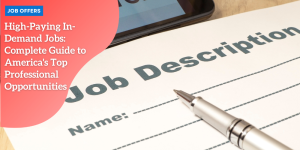How to Master Your 2025 Job Search: 8 Essential Strategies for Finance Professionals
Understand Longer Hiring Timelines in the Current Market
Navigating the job market in 2025 means acknowledging and adapting to extended hiring timelines.
Anúncios
The post-pandemic shift has introduced longer lead times from application submission to final job offer.
Employers are cautious, taking more time to evaluate candidates thoroughly.
Patience is essential, but ensure that this doesn’t translate into complacency—follow up after 1-2 weeks to stay on their radar.
Anúncios
Prepare for Remote Work Capabilities and Setup
Remote work has become a norm rather than an exception, making it crucial to be well-prepared for remote job roles. To improve your chances:
Ensure you have a dedicated workspace, ideally a quiet room where you can close the door.
Equip your space with reliable internet, a good-quality webcam, and a comfortable chair.
Familiarize yourself with remote collaboration tools like Zoom, Microsoft Teams, and Slack.
Having the right setup not only makes you a strong candidate but also demonstrates your flexibility and readiness for the modern work environment.
Balance Work-Life Considerations During Job Search
Job hunting in 2025 requires balancing your professional aspirations with personal well-being. Be mindful of the following:
Anúncios
Time Management: Allocate specific hours each day or week to job searching. This helps you stay organized without feeling overwhelmed.
Family and Personal Time: If you have children or other dependents, create a schedule that accommodates their needs while carving out uninterrupted time for job-related activities.
Self-Care: Searching for a job can be stressful. Incorporate relaxation and hobbies into your routine to maintain mental health.
It’s important to remember that your job search is a part of your life, not your entire life.
Striking this balance will help you maintain productivity and positivity throughout the process.
By understanding longer hiring timelines, preparing for remote work, and balancing work-life considerations, you set a strong foundation for a successful job search.
Now, let’s explore how to get organized for success in your job hunt.
Getting Organized for Success
Start Your Job Search Early and Proactively
The key to a successful job search in 2025 is starting early and being proactive.
Given the longer hiring timelines in the current market, it’s essential to get ahead by beginning your job hunt well in advance.
Rather than waiting for a panic-induced last-minute scramble, allocate regular time to refine your interview skills and connect with potential leads.
This proactive approach can give you an edge and make the tough process of job hunting a bit more manageable.
Create a Tracking Spreadsheet for Applications and Follow-ups
Organization is paramount during the job search. Using a tracking spreadsheet can keep you on top of your applications and follow-ups. Document every job you apply to, the date of application, the company name, the position, and the contact details of the hiring manager. Make note of the follow-up timeframes to ensure you stay on track with your job search. This method allows you to adjust your approach based on feedback and maintain a clear view of your progress.
Allocate Dedicated Time for Job Hunting Activities
Balancing job hunting with daily responsibilities can be tough.
To stay focused, allocate specific blocks of time in your schedule solely for job hunting activities.
This includes searching for new opportunities, tailoring your resume and cover letter, preparing for interviews, and networking.
By treating your job hunt like a job itself, with dedicated hours, you will maintain steady progress while keeping your current job or personal commitments in balance.
Finally, remember that the structure and discipline you apply to your job search can equate to a more productive and less stressful experience.
Being organized not only keeps the momentum going but also shows potential employers that you are serious and committed to finding the right opportunity.
Next, you’ll want to ensure that your professional profile is optimized to stand out to recruiters and hiring managers.
Optimizing Your Professional Profile
A well-optimized professional profile is essential in the competitive job market of 2025.
With recruiters sifting through countless resumes and profiles daily, making a strong first impression can set you apart from the crowd.
Here’s how you can do it.
Update and Customize Resume and Cover Letter for Each Application
Gone are the days of using a one-size-fits-all resume for various job applications.
Employers seek candidates who go the extra mile to tailor their documents to the specific role.
Start with creating a master resume that lists all your experiences, skills, and accomplishments.
For each job application, customize your resume to highlight the most relevant experiences and skills that match the job description.
Do the same with your cover letter.
While a standard outline may be helpful, make sure to personalize it for each application.
Address the hiring manager by name, mention the specific role you’re applying for, and explain why you’re the perfect fit for the position.
This shows prospective employers that you’ve done your homework and are truly interested in the job.
Enhance LinkedIna Profile with Current Information and Recommendations
Your LinkedIna profile is often the first place recruiters check after viewing your resume, so it’s crucial to keep it up-to-date.
Make sure your profile aligns with your resume, showcasing the same experiences and skills.
Add recent projects, accomplishments, and a professional photo that presents you in the best light.
Utilize the “About” section to craft a compelling and concise narrative about your career, highlighting key achievements and your professional goals.
Also, seek recommendations from colleagues, supervisors, and clients you’ve worked with.
These endorsements can add significant value and credibility to your profile.
Clean Up Social Media Presence for Professional Image
While LinkedIna is your primary professional network, other social media platforms can also affect your job prospects.
Potential employers often search for candidates online to get a sense of their public persona.
It’s essential to clean up your Facebook, Twitter, Instagram, and other social profiles.
Remove or hide any posts, photos, or comments that might be deemed unprofessional or controversial.
You can adjust your privacy settings to limit what others can see.
Also, consider sharing content related to your industry to showcase your passion and knowledge in your field of expertise.
A polished and professional online presence reflects positively on you as a candidate.
Optimizing your professional profile requires attention to detail and a proactive approach.
Investing time in these steps can significantly enhance your job search and help you stand out in a crowded market.
Next, we’ll explore strategic job search techniques that will maximize your chances of landing the perfect role.
Strategic Job Search Techniques
Focus on Recently Posted Positions
One of the most crucial aspects of a job search is to focus on recently posted positions.
Job postings that are within a month old are more likely to be active and available.
This means you are less likely to waste time applying for positions that have already been filled or are no longer available.
Make it a habit to regularly check job boards, company websites, and professional networking platforms like Linkedin to find the most current listings.
This proactive approach will keep you ahead of the competition and improve your chances of landing timely interviews.
Diversify Your Job Search Platforms
Relying on a single job search platform can limit your opportunities.
Instead, diversify your search across multiple platforms and company websites.
Each platform has unique listings and may provide access to different types of job openings.
Job Aggregators: Use websites like Indeed, Glassdoor, and Monster to cast a wide net.
Company Websites: Visit the careers sections of the companies you are interested in to find exclusive job postings.
Specialized Job Boards: Depending on your industry, look into niche job boards that cater specifically to your field. For example, finance professionals might use eFinancialCareers.
By exploring multiple sources, you’ll increase your chances of finding the perfect job match.
Consider Alternative Roles and Industries
While it is important to define your career goals, it’s equally important to consider alternative roles and industries, especially in a competitive job market.
This flexibility can open up opportunities you might not have initially considered but that still leverage your skills and experience.
Alternative Roles
Be open to jobs that may not be your ideal position but can provide valuable experience.
For instance, if you are seeking a permanent role in project management but find a temporary position as a project coordinator, it might be worth considering.
This role can offer relevant experience, immediate income, and a potential pathway to your desired position.
Expanding Industries
Think about industries related to your field that are experiencing growth.
For example, if you are in marketing, you might find opportunities in tech startups or e-commerce, which are industries currently on the rise.
By broadening your search criteria, you’ll discover more chances to apply your skills in new ways.
Remaining flexible and adaptable in your job search will significantly enhance your prospects.
By focusing on recently posted positions, diversifying your search methods, and being open to alternative roles and industries, you’ll stay competitive in a challenging job market.
As you continue your job search journey, these strategies will equip you with the resilience and adaptability required to succeed.
Leveraging Online Networking
Connect with First and Second-Degree Linked Connections
When diving into the job hunt, leveraging your Linked network is crucial.
Begin by connecting with your first and second-degree connections, prioritizing those who’ve worked in companies or industries you’re aiming to join.
If you have acquaintances or colleagues in these fields, don’t hesitate to reach out for informational chats.
Personalizing your messages and demonstrating genuine interest can make a huge difference.
Additionally, join industry-specific Linked groups and actively participate in discussions.
This not only increases your visibility but also connects you with professionals who may know of openings you’re suited for.
Reach Out Directly to Hiring Managers
One effective approach is to find the hiring manager of the specific role or department you’re interested in within a company.
Linked makes this process relatively straightforward.
After identifying the right individual, send a personalized InMail or connection request highlighting your interest and how your skills align with their needs.
Be concise and professional in your messages.
Mention any mutual connections or common ground to establish rapport.
Hiring managers are often busy, so being clear about your intentions and respectful of their time can enhance the probability of a response.
Maintain Follow-Up Communication
Following up is essential but should be done with tact and patience.
After an initial outreach, give it about one to two weeks before sending a follow-up message.
This demonstrates your interest without appearing overly persistent.
If a hiring manager indicates that there aren’t current openings, kindly ask about potential future opportunities and when it might be a good time to reconnect.
Keeping a detailed spreadsheet of your communications can help you track contacts, follow-up dates, and any other pertinent information.
This organized approach ensures you stay on top of your networking efforts without overwhelming any one individual.
By effectively leveraging your professional network and maintaining consistent, thoughtful communication, you’ll expand your job search horizons and open doors that might otherwise remain closed.
With your networking strategies polished, it’s time to turn your focus to another essential aspect – preparing for virtual interviews.
Just as networking requires preparation and follow-through, so too does acing your virtual interview.
Mastering Virtual Interviews
Navigating the landscape of virtual interviews can be daunting, but with the right preparation, you can excel.
Let’s explore the best ways to set yourself up for success during online interviews.
Preparing the Environment
Creating an ideal space for your virtual interviews is crucial.
Choose a location in your home that is quiet, clutter-free, and well-lit.
Ideally, this should be a room where you can close the door to minimize interruptions.
A simple background that isn’t distracting to the interviewer helps maintain focus on you, not your surroundings.
Before your scheduled interview, ensure that all the software you’ll use is downloaded and tested 8 job hunting tips and strategies you should know docx.
Conduct a test run with a friend to check if your lighting, audio volume, and camera positioning are optimal.
It’s also vital to test your internet connection to avoid any last-minute hiccups.
Maintaining Professional Appearance
Even though you’re at home, treat the interview with the same seriousness as an in-person meeting.
Dress in professional attire from head to toe—you never know when you might need to stand up unexpectedly.
During the interview, be conscious of your tone and body language.
Maintain eye contact by looking into the camera and use gestures naturally to underline your points.
Starting with a brief rapport-building question can help ease both you and the interviewer into the conversation, creating a more relaxed and engaging atmosphere.
Developing a Backup Plan
Technical issues can sometimes be inevitable, so having a contingency plan is essential.
Before the interview, share your contact details with the interviewer as an alternative method to continue the conversation if needed Unique Links to Cite.
This foresight demonstrates your adaptability and professionalism, ensuring the interview can proceed smoothly, even if technical difficulties arise.
Preparing questions about the company’s remote work policies or their industry response to ongoing challenges not only enhances your engagement but shows you are considering the employer’s stability seriously.
By following these strategies, you can effectively master the virtual interview process, showcasing your professionalism and adaptability.
In the following sections, we’ll delve into ways to continuously develop your skills, ensuring that you remain competitive and ready for any opportunity that comes your way.
Continuous Skill Development
Identify and Acquire Relevant Industry Skills
As technology and industry standards evolve, it’s essential to stay current and relevant within your chosen field.
Start by identifying the skills that are in high demand for your industry.
Resources like Linked Learning, Coursera, or industry-specific platforms can provide insights into the necessary competencies.
Additionally, look at job descriptions of roles you’re interested in and note the skills most frequently mentioned.
Once you have a list, prioritize obtaining certifications or completing courses that will bridge any gaps in your skillset.
This proactive approach not only improves your marketability but also demonstrates your commitment to continuous learning.
Utilize Spare Time for Professional Development
Job hunting can be a time-intensive endeavor, but it can also present opportunities for personal growth.
Dedicate a portion of each day or week to developing new skills.
The pandemic has illustrated the value of adaptability, making it crucial to learn new technologies or methodologies that can enhance your versatility as an employee.
Consider balancing relaxation with productive activities by scheduling specific blocks of time for professional development.
Engaging in short, manageable tasks will help you build momentum and make steady progress without feeling overwhelmed.
Stay Current with Industry Trends and Requirements
Keeping up with industry trends is vital to maintaining your competitive edge.
Subscribe to industry news outlets, join relevant professional groups, and attend webinars or virtual conferences.
Networking within these communities can also provide insights into emerging trends and in-demand skills.
Companies value employees who are not only knowledgeable about current best practices but also anticipate future developments.
Regularly updating yourself on industry news ensures you’re prepared for changing job market demands, and it can even provide talking points for interviews.
By continuously developing your skills, you’ll be well-prepared for the opportunities that come your way.
Engaging in ongoing learning and staying updated on industry trends will enhance your career prospects and position you as a valuable candidate in any job search.
Keep pushing forward, and remember that every skill you acquire is a step closer to achieving your career goals.
Maintaining Momentum
Throughout your job search process, maintaining momentum is crucial.
Here’s how you can ensure your efforts are consistent and productive.
Follow Up Consistently on Applications
It’s easy to feel like your applications disappear into a void, but consistent follow-up can help keep you top-of-mind for hiring managers.
Typically, wait about one to two weeks after submitting your application before reaching out. A polite email or LinkedIn message can help reinforce your interest and prompt a response.
Ask for potential timing on hiring decisions, if possible.
This way, you can schedule a follow-up if there’s no feedback within the discussed timeframe.
Consistency in following up is key, but always remain courteous and professional in your communications.
Stay Resilient During Extended Search Periods
Job hunting can be a marathon, not a sprint, especially in the current market conditions.
Resilience is indispensable. Remember, rejection is often not a reflection of your abilities, but rather the high competition and specific needs of hiring companies.
To stay resilient:
Set realistic expectations and understand that extended timelines are common.
Celebrate small victories, such as getting an interview or making a new professional connection.
Surround yourself with a supportive network of friends, family, and fellow job seekers.
Keeping a positive outlook and steady pace will make the journey more manageable and less stressful.
Balance Job Search with Current Work or Personal Commitments
Balancing job search activities with work or personal commitments can be challenging. Here’s how to manage it effectively:
Allocate specific times in your weekly schedule for job search activities. This could be early mornings, evenings, or weekends, depending on your current job or personal routine.
Break down tasks into smaller chunks. Write tailored resumes, cover letters, and follow-up messages in shorter, focused sessions.
Use tools like planners or digital calendars to organize your time efficiently. This ensures you stay on top of your job applications and interviews without letting other responsibilities slide.
Additionally, take breaks when necessary to avoid burnout.
Use this time to recharge, which will keep your job search efforts sustainable in the long run.
Staying organized, following up diligently, and balancing your commitments thoughtfully can significantly enhance your job search experience.
Embrace these strategies to stay motivated and efficient throughout the process.
Now that you’re equipped with ways to maintain momentum, continue building upon this foundation by refining your job search techniques and adapting to new opportunities.





